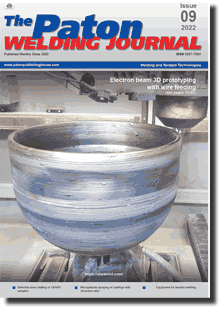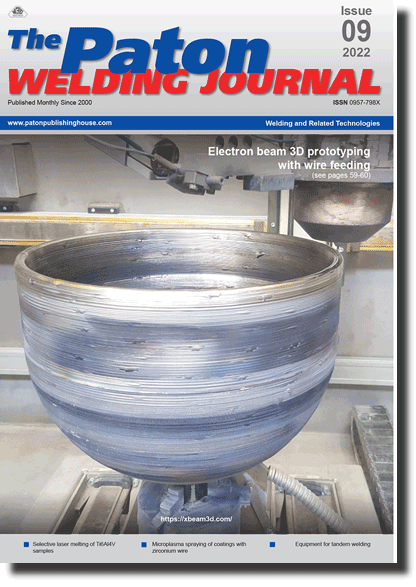| 2022 №09 (01) |
DOI of Article 10.37434/tpwj2022.09.02 |
2022 №09 (03) |

The Paton Welding Journal, 2022, #9, 11-14 pages
Influence of inoculants on the features of weld structure formation in low-alloyed steels (Review)
V.V. Holovko
E.O. Paton Electric Welding Institute of the NASU. 11 Kazymyr Malevych Str., 03150, Kyiv, Ukraine. E-mail: v_golovko@ukr.net
Abstract
The paper presents a review of studies on the influence of inoculation of dispersed refractory compounds into the weld pool on formation of weld metal microstructure in low-alloyed high-strength steels. Features of the process of primary structure formation are considered in the presence of refractory nonmetallic inclusions in the liquid metal, as well as on the interface of δ-dendrites and γ-phase. Possibilities of inoculant influence on the temperature range of bainite transformations, possibilities of formation of microstructural components with higher brittle fracture resistance, and improvement of weld metal toughness values are shown. 18 Ref., 5 Fig.
Keywords: low-alloyed steels, welding, structure, inoculants, δ-dendrites, austenite, bainite
Received: 28.06.2022
Accepted: 11.11.2022
References
1. Lee, S.J., Lee, Y.K. (2008) Prediction of austenite grain growth during austenitization of low alloy steels. Mater. Des., 29, 9, 1840-1844. https://doi.org/10.1016/j.matdes.2008.03.0092. Lambert-Perlade, A., Gourgues, A.F., Pineau, A. (2004) Austenite to bainite phase transformation in the heat-affected zone of a high strength low alloy steel. Acta Mater., 52, 8, 2337-2348. https://doi.org/10.1016/j.actamat.2004.01.025
3. Matsuzaki, Bhadeshia H.K.D.H. (1999) Effect of austenite grain size and bainite morphology on overall kinetics of bainite transformation in steels. Mater. Sci. Technol., 15, 5, 518-522. https://doi.org/10.1179/026708399101506210
4. North, T. H., Mao, X., Nakagawa, H. (1990) The Metallurgy, Welding and Qualification of Microalloyed (HSLA) Steel Weldments. International Conference, American Welding Society. Eds. J.T. Hickey, D.G. Howden and M.D. Randall, 219-248.
5. Davies, G.J., Garland, J.G. (1975) Solidification Structures and Properties of Fusion Welds. Int. Metallurgical Rev., 20, 83-10. https://doi.org/10.1179/imtlr.1975.20.1.83
6. Babu, S.S., Bhadeshia, H.K.D.H., Svensson, L.-E. (1991) Crystallographic texture and the austenite grain structure of low-alloy steel weld deposit. J. of Materials Science Letters, 10, 142-144. https://doi.org/10.1007/BF02352829
7. Yin, H., Emi, T., Shibata, H. (1999) Morphological instability of δ-ferrite/γ-austenite interphase boundary in low carbon steels. Acta Mater., 47, 1523. https://doi.org/10.1016/S1359-6454(99)00022-1
8. Griesser, S., Bernhard, C., Dippenaar, R. (2014) Effect of nucleation undercooling on the kinetics and mechanism of the peritectic phase transition in steel. Ibid, 81, 111-20. https://doi.org/10.1016/j.actamat.2014.08.020
9. Griesser, S., Bernhard, C., Dippenaar, R. (2014) Mechanism of the Peritectic Phase Transition. ISIJ Int., 54, 466-73. https://doi.org/10.2355/isijinternational.54.466
10. Fukumoto,, S., Kurz, W. (1998) Prediction of the d to g transformation in austenitic stainless steels during laser treatment. Ibid, 38, 1, 71-77. https://doi.org/10.2355/isijinternational.38.71
11. Stefanescu, M. (2006) Microstructure Evolution during the Solidification of Steel. Ibid, 46(6), 786-794. https://doi.org/10.2355/isijinternational.46.786
12. Cuixin, Chen, Haitao, Xue, Huifen, Peng et al. (2014) Inclusions and Microstructure of Steel Weld Deposits with Nanosize Titanium Oxide Addition. Journal of Nanomaterials, Article ID 138750, 7. https://doi.org/10.1155/2014/138750
13. Hideaki Suito, Hiroki Ohta, Shuhei Morioka (2006) Refinement of Solidification Microstructure and Austenite Grain by Fine Inclusion Particles. ISIJ International, 46, 6, 840-846. https://doi.org/10.2355/isijinternational.46.840
14. Furukawa, T., Saito, N., Nakashima, K. (2021) Evalution of interfacial energy between molten Fe and Fe-18%Cr-9%Ni alloy and non-metallic inclustion-type oxides. Ibid, 61, 9, 2381-2390. https://doi.org/10.2355/isijinternational.ISIJINT-2020-696
15. Bhadeshia, H.K.D.H., Svensson, L.E. (1993) Modelling the Evolution of Microstructure in Steel Weld Metal. Mathematical Modelling of Weld Phenomena. Eds H. Cerjak, K.E. Easterling. Institute of Materials, London, 109-182.
16. Isobe, K. (2010) Effect of Mg addition on solidification structure of low carbonsteel. ISIJ International, 50, 12, 1972-1980. https://doi.org/10.2355/isijinternational.50.1972
17. Xuan, Ch., Shibata, H., Sukenaga, S. et al. (2015) Wettability of Al2O3, MgO and Ti2O3 by Liquid Iron and Steel. Ibid, 55, 9, 1882-1890. https://doi.org/10.2355/isijinternational.ISIJINT-2014-820
18. Holovko, V.V., Yermolenko, D.Y., Stepanuk, S.N. et al. (2020) Influence of introduction of refractory particles into welding pool on structure and properties of weld metal. The Paton Welding J., 8, 9-15. https://doi.org/10.37434/as2020.08.01
Suggested Citation
V.V. Holovko (2022) Influence of inoculants on the features of weld structure formation in low-alloyed steels (Review). The Paton Welding J., 09, 11-14.The cost of subscription/purchase order journals or individual articles
| Journal/Currency | Annual Set | 1 issue printed |
1 issue |
one article |
| TPWJ/USD | 384 $ | 32 $ | 26 $ | 13 $ |
| TPWJ/EUR | 348 € | 29 € | 24 € | 12 € |
| TPWJ/UAH | 7200 UAH | 600 UAH | 600 UAH | 280 UAH |
| AS/UAH | 1800 UAH | 300 UAH | 300 UAH | 150 UAH |
| AS/USD | 192 $ | 32 $ | 26 $ | 13 $ |
| AS/EUR | 180 € | 30 € | 25 € | 12 € |
| SEM/UAH | 1200 UAH | 300 UAH | 300 UAH | 150 UAH |
| SEM/USD | 128 $ | 32 $ | 26 $ | 13 $ |
| SEM/EUR | 120 € | 30 € | 25 € | 12 € |
| TDNK/UAH | 1200 UAH | 300 UAH | 300 UAH | 150 UAH |
| TDNK/USD | 128 $ | 32 $ | 26 $ | 13 $ |
| TDNK/EUR | 120 € | 30 € | 25 € | 15 € |
AS = «Automatic Welding» - 6 issues per year;
TPWJ = «PATON WELDING JOURNAL» - 12 issues per year;
SEM = «Electrometallurgy Today» - 4 issues per year;
TDNK = «Technical Diagnostics and Non-Destructive Testing» - 4 issues per year.


